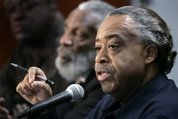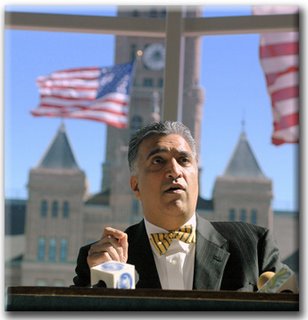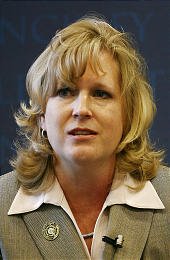Rev. Sharpton faults the Christian right
By KEN KUSMER, Associated Press Writer 1 hour, 38 minutes ago
INDIANAPOLIS - The Rev.
Al Sharpton' name=c1> SEARCHNews News Photos Images Web' name=c3> Al Sharpton criticized the Christian right Tuesday for focusing too much political discussion on abortion and same-sex marriage and said black churches must talk about fighting poverty, equal access to education and other social justice issues.
With comedian/activist Dick Gregory at his side, Sharpton also condemned Indiana's new voter ID law requiring people to present government-issued identification at the polls.
"We have been inundated in the faith community with bedroom sexual morality issues and not dealing with the broader moral issues of poverty, of injustice and of health care," Sharpton said at a news conference amid a two-day meeting of talks and revivals.
"We can no longer be misused by some in the Christian right that will not deal with the broader issue of injustice and fairness and inequity in our society," the 2004 Democratic presidential candidate said.
The Rev. Jeffrey Johnson, whose Eastern Star Church hosted the meeting, said the issues at stake in next Tuesday's election go beyond personal morality to broader questions.
"Why are half of our Afro-American boys not graduating from high school? Why is there 1.1 million more people in poverty over the past few years while we're talking about the better economy, and 11 percent of African-Americans are unemployed?" Johnson said.
Conservative Christian leaders said the problems Sharpton and Johnson cited were symptomatic of more fundamental ills.
"You've got to go beyond that and address the root causes, which is the breakdown of family and morality," said Tony Perkins, president of the Washington, D.C.-based Family Research Council.
Stable homes for children will lead to better education, higher social attainment and lower incarceration rates, Perkins said.
The Rev. Jesse Lee Peterson, a black conservative who leads the Los Angeles-based Brotherhood Organization of a New Destiny, or BOND, said Sharpton was most concerned with Democrats regaining political power.
"Jobs and education — those things come when families are united," Peterson said.
Sharpton said his agenda was nonpartisan.
He also criticized Indiana's new voter ID law, which will be tested in a general election for the first time next Tuesday. He compared it to poll taxes and other barriers to voting that blacks have faced.
"Now we don't ask you, 'Did your granddaddy vote?' when you know your granddaddy was a slave. We ask you for identification that we know large percentages of you would not have, given the social circumstances beyond your control," Sharpton said.
The U.S.
Census Bureau' name=c1> SEARCHNews News Photos Images Web' name=c3> Census Bureau reported last March that only about 56 percent of blacks voted in the 2004 general election, compared with about 66 percent of whites. Among blacks who registered to vote but did not cast ballots, 7.2 percent cited registration problems.
The
American Civil Liberties Union' name=c1> SEARCHNews News Photos Images Web' name=c3> American Civil Liberties Union of Indiana and Indiana Democrats have challenged the voter ID law before the 7th U.S. Circuit Court of Appeals. No ruling is expected before next week's election.
The conference at Eastern Star Church was the third in a series this year by Sharpton's National Action Network, following gatherings last summer in Dallas and Augusta, Ga. The fourth begins Thursday in Detroit.
___
On the Net:
National Action Network: http://us.rd.yahoo.com/dailynews/ap/ap_on_el_ge/storytext/sharpton_politics/20789757/SIG=117u949dk/*http://www.nationalactionnetwork.net/
Brotherhood Organization of a New Destiny: http://us.rd.yahoo.com/dailynews/ap/ap_on_el_ge/storytext/sharpton_politics/20789757/SIG=10qnotk3l/*http://www.bondinfo.org/














 Sim Gill / David Yocom
Sim Gill / David Yocom










